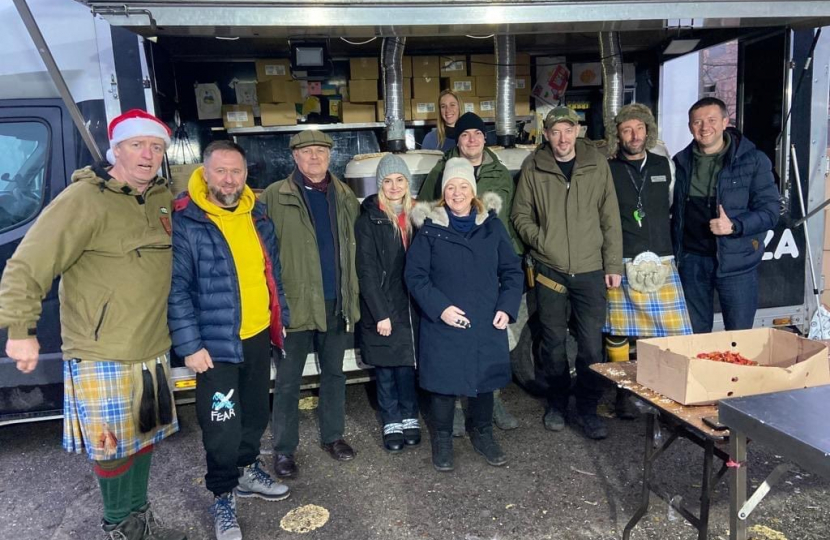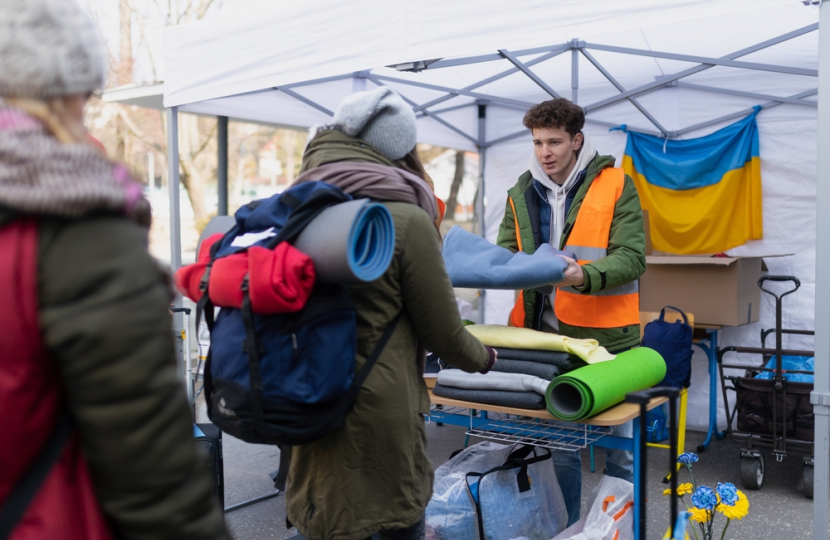An unofficial trip to assist a British aid charity allowed me to witness a humbling testament to the spirit of endurance.
A couple of weeks ago, Labour MP Judith Cummins and I set off on a cross-party visit to Ukraine. The purpose was twofold: to see first-hand the effects of the war on the towns and villages close to the fighting and to visit a remarkable British charity now ensconced in the most difficult and dangerous parts of the country.
When Russia brutally invaded Ukraine some 10 months ago, a remarkable charity called Siobhan’s Trust moved to the border of Poland. Run by David Fox Pitt, they set about feeding thousands of tired and bewildered Ukrainian refugees with pizza, often the only hot meal they were likely to get that day. Now based in Ukraine and as close to the front line as possible, they go where they are needed, regardless of risk.
It is a peculiarly British story of eccentricity and determination, breaking through bureaucratic obstacles and doing what no one had thought of before.
Our visit was unofficial, organised by the charity and its Ukrainian helpers. As such we were able to experience first-hand the difficulties and problems of living in the war-torn country.
Driving across the vast flat expanse of Ukraine’s rich farmland – sadly covered in unharvested crops – to Kyiv took us nearly eight hours along roads often half finished and peppered with army checkpoints.
We stopped briefly in the capital to meet Ukrainian MPs who were part of the cross-party “British” group. One female MP cried as she spoke of her husband who had been shot dead by the Russians.
All of them praised the British but said they feared the free world was growing tired of the war. Their list of equipment needs was long. They questioned Germany’s resolve in particular and its delay in providing Leopard tanks. One of the MPs even wondered out loud if the delays were part of a plan to force President Volodomyr Zelensky to the negotiating table.
From there towards the front line at Kharkiv in the north-east took another six hours of driving. Once there, the full extent of Moscow’s brutality became apparent.
As the Russians tried to take the city last year, they laid waste to whole blocks of housing. Shells and missiles destroyed vast numbers of flats – there was often no warning and the occupants were still inside. We were shocked at the wanton destruction – schools and hospitals, all targeted, many destroyed.
Visiting areas just three kilometres (1.9 miles) from the Russian border, we saw once thriving villages laid waste by the war. In each, the soldiers spoke of how they were littered with dead civilians. We were not allowed to step off the paths because the Russians had mined the area indiscriminately.
Yet amid the wreckage, covered in thick, freezing snow, I spied a thin wisp of grey smoke curling upwards from a metal pipe. The broken, boarded-up shack was once a house but had been hit by artillery. Incredibly, someone was still in there, hanging on in sub-zero temperatures, a humbling testament to Ukrainian endurance.
Our visit to the area’s military hospital was deeply troubling. Housed in a bomb-damaged building and still attacked by Russian rockets daily, it was here that we were reminded of the desperate after-effects of post-traumatic stress disorder. Many Ukrainian soldiers take their lives every day as a result and desperately need help.
Overstretched already, these hospitals urgently need combat stress specialists from the UK and the USA. They also require more British armoured ambulances and people with paramedic skills.
After that, we helped Siobhan’s Trust volunteers from around the world – Americans, Australians, Zimbabweans, Britons and Ukrainians – feed thousands of people near the front line. As the pizza trucks pulled into town, a large queue had already formed in the freezing cold, at the head of which stood a formidable group of old women.
What followed was hot drinks, pizzas, music and even some highland dancing by Mr Fox Pitt and his team wearing kilts modelled on the Ukrainian colours. All this lifted the spirits of the people and put a smile on their faces – they even joined in.
To date, the trust has fed some half a million people, up to 4,000 a day. It is a heart-warming story, a remarkable labour of love to help our fellow human beings in their time of need.
Yet as we left, more rockets fell in the places we had visited, including near the military hospital.
The plea from everyone we met has been ringing in our ears ever since: “Please don’t forget us. Please help us get back our country for the sake of our families who have died at the hands of the Russians.”
Those words have haunted me. Yes, it’s tough here in the UK at the moment – but in Ukraine they are fighting and dying for their freedom.
Let the West not commit the mistake of the 1930s and see the war in Ukraine as a “quarrel in a faraway country, between people of whom we know nothing”. Rather, let us remember in our prayers a remarkable people who are enduring so much at the hands of a despot named Vladimir Putin and commit to see their fight as our own.





